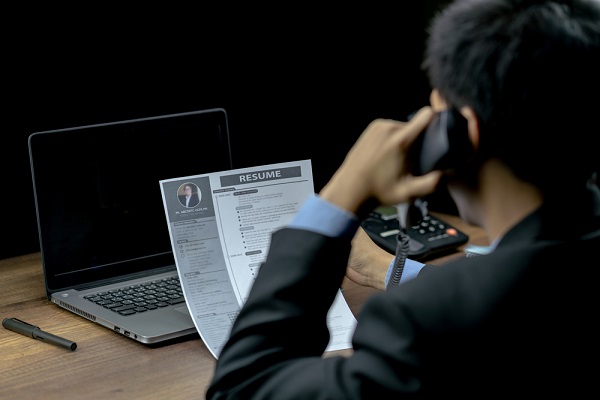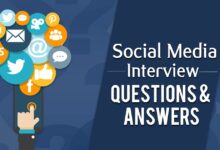Telephonic Interview Questions And Answers

There are a lot of telephonic interview questions and answers that you can prepare for. Some telephonic interview questions might be similar to an in-person interview, but others might be more difficult because the interviewer cannot see your body language or facial expressions. This blog post will talk about telephonic interview questions and how you can prepare for them, so it is easier for yourself and the interviewer!
How to answer phone interview questions?
Do your research, know all the relevant facts about the company in advance. Treat it like an interview in person. Always answer questions in complete sentences and take time to think before answering, but stay concise with your answers, so you don’t run out of steam when the interviewer is finally impressed with your speech! As always, be sure to practice what you’re going to wear; that way, if it’s not appropriate or if luggage gets lost, then you’ll still have something presentable to wear (and won’t end up overdressed for a casual job).
Preparing for a phone interview
We strongly recommend rehearsing mock interviews before the actual day of your interview. This will allow you to time the conversation, discover any speech impediments and how to handle them, think about what you’re going to talk about, and do a bunch of different other things that may turn out to be invaluable on the day.
Here’s a short checklist that makes it easier to prepare for a phone interview.
- Create a list of skills or accomplishments that would be appropriate to mention in the interview
- Write out possible questions and show how you would answer them.
- Clothes? What should I wear? Dress casual but clean and pressed. No jeans. If you’re wearing dress pants, ditch the shoes and go sockless, so there’s no noise when he walks around his desk during the call.
- Have your resume printed out if possible, which gives you something to point at if he asks about work experience
- Turn off all phones, TVs, radios – anything during the hour before the call, so they aren’t any distractions.
Steps after your phone interview
- Wait to hear back from the company if you were selected for a final round of interviews (usually by phone or in-person). If no response, try calling the HR department and leaving a message with your contact information.
- Send your interviewer’s feedback following each interview that they requested;
- Create an online portfolio to showcase your experience and skills
- Follow up with past recruiters/interviewers with simple calling cards like thank-you cards or email messages saying, “I heard about this position, and I’m very interested.” You can also include a link to your resume on LinkedIn. Be sure not to spam recruiters if they don’t remember you, as that could hurt any chances of advancement.
11 Telephonic Interview Questions And Answers
-
Tell me about yourself.
Example: I come from a line of “adventurers”. When I was growing up, my dad would take my sister and me skiing or biking – never too distant from home. In high school, I served as the president of the French club and competed on the varsity volleyball team. One of my main interests was foreign languages throughout college, so I studied at both Fudan University in Shanghai, China, and Griffith University in Brisbane, Australia, for a semester abroad. As a result, I gained proficiency in Mandarin Chinese and became immersed in Australian culture.
-
Why are you job searching right now?
Example: I’m looking for a company with an exciting culture, variable hours, and a healthy work/life balance.
I think I’d be a great fit based on the unique qualities of my resume and my employment history. From my perspective, it looks like your staff is all pleased and that you guys have some solid opportunities to explore innovation and creativity – passions that resonate with me. It would be cool if we could chat about how I might fit in there and find out more about your company culture and what kind of team they’re building over there.
-
What do you know about our company?
Answer: I have read a few of your company articles and watched your company videos. I have been following the company for some time, and I see it as a company defining its short history. It’s elegant, authentic, and filled with love by those who work there. You’ve created something extraordinary in such a short span. Knowing this made me eager to become part of those groups creating something wonderful – always bringing those 3 critical elements to life!
-
How is your job search going?
Answer: “I am still looking and hopeful for a better position than my current one.”
-
Tell me about your most recent job. What were you responsible for each day?
Answer: My most recent job was as a front-end developer for a startup company. I was responsible for coding daily, helping design how the data should look and the UI. Daily tasks varied from analyzing data to find critical insights to brainstorming interface designs for potential partners.
-
Would you please show me your resume?
Answer: Here is my resume. Please see the attachment.
-
What other jobs have you been interviewing for?
Example: I have been interviewing for a writing position I found. There have not been any leads on anything else as of yet.
-
Which of your traits will help you excel in this role?
Example: My deep knowledge in the field. I have extensive experience with all aspects of this job, giving me a breadth of problem-solving abilities, which are often lacking in other applicants. My organizational skills will also help me excel because I love to create well-thought-out plans for projects and stick to them until they are completed.
-
How do you resolve a disagreement between you and a coworker?
Answer: It’s vital to keep the disagreement professional, if possible. If you find yourself arguing with someone rather than talking, walk out of the office or move to another part of it so everyone can cool off. Once you’ve taken a break, try to reach an understanding even if one person needs time before they feel comfortable doing so.
- Mindtree Interview Questions
- IBM Interview Questions
- Genpact Interview Questions
- Tech Mahindra Interview Questions
If you still can’t agree eventually, put it on hold for now and start thinking about what other disagreements may crop up again in the future that will require resolution; identifying these beforehand could be helpful later on.
It is also important not to dissuade other employees from making mistakes once conflict has been resolved – all people should be given space like individuals trying their best! The important part is to provide them with the support they need.
-
When are you available to start?
I’m ready to begin whenever you need me to begin, and I’d be delighted to start as soon as possible. or you can answer like this:
I need (or would greatly appreciate) a few days (or a week or two) to straighten up before I begin, but I’m flexible.
5 Good Questions to Ask at the end of a phone interview
- How do you prefer to receive information?
- What’s the next step in our interview process?
- When will I hear back from you about the position?
- Do you need any additional information from me or my references before your decision is finalized?
- What are some other opportunities you have open at your company that may interest me?







